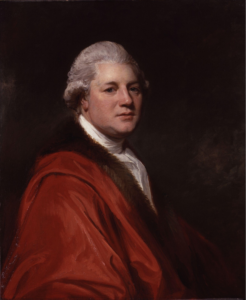Lorma
(Poet's title: Lorma)
Set by Schubert:
D 327
[November 28, 1815]
D 376
[February 10, 1816]
Lorma saß in der Halle von Aldo.
Sie saß beym Licht einer flammenden Eiche.
Die Nacht stieg herab,
aber er kehrte nicht wieder zurück.
Lormas Seele war trüb.
»Was hält dich, du Jäger von Cona, zurück.
Du hast ja versprochen, wieder zu kehren,
waren die Hirsche weit in der Ferne?
Brausen an der Heide die düstern Winde um dich,
ich bin im Lande der Fremden,
wer ist mein Freund, als Aldo?
Komme von deinen erschallenden Hügeln,
o mein bester Geliebter!«
Sie wandt ihre Augen gegen das Tor.
Sie lauscht zum brausenden Wind.
Sie denkt, es seien die Tritte von Aldo.
Freud steigt in ihrem Antlitz,
aber Wehmut kehrt wieder,
wie am Mond eine dünne Wolke, zurück.
Lorma sat, in Aldo’s hall.
She sat at the light of a flaming oak.
The night came down,
but he did not return.
The soul of Lorma is sad!
“What detains thee, hunter of Cona?
Thou didst promise to return.
Has the deer been distant far?
do the dark winds sigh round thee, on the heath?
I am in the land of strangers,
who is my friend, but Aldo?
Come from thy sounding hills,
O my best beloved!”
Her eyes are turned toward the gate.
She listens to the rustling blast.
She thinks it is Aldo’s tread.
Joy rises in her face!
But sorrow returns again,
like a thin cloud on the moon.
English original
All translations into English that appear on this website, unless otherwise stated, are by Malcolm Wren. You are free to use them on condition that you acknowledge Malcolm Wren as the translator and schubertsong.uk as the source. Unless otherwise stated, the comments and essays that appear after the texts and translations are by Malcolm Wren and are © Copyright.
☙
Themes and images in this text:
Clouds Deer Doors and gates Fire Heathland and moors Hills and mountains Hunters and hunting Joy Night and the moon Oak trees Waiting War, battles and fighting Wind
This extract comes from the final part of ‘The Battle of Lora’. Macpherson offers his own summary of this poem (1762 edition):
Fingal, on his return from Ireland . . . made a feast to all his heroes; he forgot to invite Ma-ronnan and Aldo, two chiefs, who had not been along with him in his expedition. They resented his neglect and went over to Erragon, king of Sora, a country of Scandinavia, the declared enemy of Fingal. The valour of Aldo soon gained him a great reputation in Sora: and Lorma, the beautiful wife of Erragon, fell in love with him. He found means to escape with her and come to Fingal, who resided then in Selma, on the western coast. Erragon invaded Scotland, and was slain in battle . . . In this war Aldo fell, in a single combat, by the hands of his rival Erragon, and the unfortunate Lorma afterwards died of grief.
We join Lorma as she is waiting for her lover to return. Unlike most such scenes in Ossian (e.g. D 282 Cronnan) the scene is not set outside on the open heath. We are in Aldo’s hall for the simple reason that Lorma cannot go out. She has run away from her husband and is totally dependent on Aldo. She tells herself that he is away hunting the deer, but she must know what is really going on. All the talk of hunting and bad weather can only be a way of trying to stop herself thinking about her perilous situation. The men are fighting over her, and her only hope is that Aldo will defeat Erragon. If he does not, then the consequences for her do not bear thinking about, which is why she is pretending not to think about them. However, with every moment that Aldo does not return, with each raised and dashed hope as the sounds turn out not to be his footsteps, her doom becomes ever clearer.
☙
Original Spelling Lorma Lorma saß in der Halle von Aldo. Sie saß beym Licht einer flammenden Eiche. Die Nacht stieg herab, aber er kehrte nicht wieder zurück. Lormas Seele war trüb! »Was hält dich, du Jäger von Cona, zurück. Du hast versprochen wieder zu kehren. Waren die Hirsche weit in der Ferne? Brausen an der Heyde die düstern Winde um dich! ich bin im Lande der Fremden, wer ist mein Freund, als Aldo? komm von deinen erschallenden Hügeln, o mein bester Geliebter!« Sie wandt ihre Augen gegen das Thor. Sie lauscht zum brausenden Wind. Sie denkt, es seyen die Tritte von Aldo. Freud steigt in ihrem Antlitz! aber Wehmut kehrt wieder, wie am Mond eine dünne Wolke, zurück.
Confirmed with The Poems of Ossian. Translated by James Macpherson, Esq; Vol.I. A new edition, carefully corrected, and greatly improved. London, MDCCLXXIII, pages 402-403.
Confirmed by Peter Rastl with Schubert’s source, Die Gedichte Ossians eines alten celtischen Helden und Barden. Zweyter Band. Zweyte verbesserte und mit neu entdeckten Gedichten vermehrte Auflage. Mannheim, 1782. im Verlage der Herausgeber der ausländischen schönen Geister, pages 282-283.
To see an early edition of the text, go to page 282 [Erstes Bild 288] here: https://download.digitale-sammlungen.de/BOOKS/download.pl?id=bsb10035581


